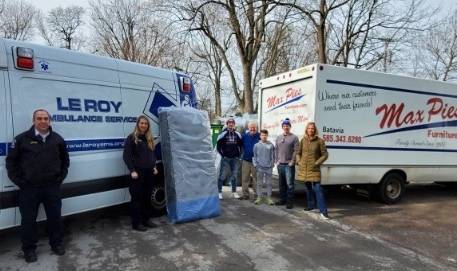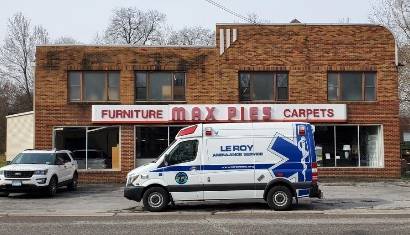Press release:
ITHACA -- Tompkins Financial Corporation (NYSE American:TMP), parent company of Tompkins Bank of Castile, Tompkins Insurance Agencies, and Tompkins Financial Advisors, has reported record year-to-date and first quarter earnings.
Tompkins Financial Corporation Reports Cash Dividend
Tompkins Financial Corporation announced today that its Board of Directors approved payment of a regular quarterly cash dividend of $0.52 per share, payable on May 18, 2020, to common shareholders of record on May 11, 2020.
Tompkins Financial Corporation Reports First Quarter Earnings
Tompkins Financial Corporation announced net income attributable to common shareholders of $7.9 million, or $0.53 per diluted common share for the first quarter of 2020, compared to $21.0 million, or $1.37 per diluted common share, for the first quarter of 2019. Results for the first quarter of 2020 were negatively impacted by current economic stress resulting from the COVID-19 pandemic, which contributed to the $16.3 million provision for credit losses recognized during the quarter under the new current expected credit losses (CECL) accounting standard. Refer to "Asset Quality" section for further discussion of the impact on the Company's financial statements upon adoption of this new accounting guidance.
"These are clearly unprecedented times for our country and our communities. I am extremely proud of the exceptional way the Tompkins team has stepped up to the current environment by addressing the specific challenges of our clients and communities who are facing hardships due to the COVID-19 pandemic. Though these are unprecedented times, Tompkins enters this environment well prepared to face the many challenges and difficulties we are all dealing with as a result of the pandemic. Over recent years, we have invested significantly in digital technologies to improve capabilities that allow our customers to bank remotely. We have also invested significantly in our internal systems, which allowed nearly 100 percent of our non-retail employees to transition quickly and securely to remote working environments with limited disruption to our business. Furthermore, we entered 2020 with a strong financial position, coming off a year of record earnings per share in 2019, and with our 2019 Risk Based Capital Ratio at its highest level since 2014."
SELECTED HIGHLIGHTS FOR THE FIRST QUARTER:
Despite the decline in earnings from the prior year, there were several favorable trends noted during the first quarter of 2020, including:
• Total loans of $4.9 billion were up 3.1 percent over March 31, 2019
• Total deposits of $5.4 billion increased by 8.4 percent over March 31, 2019
• Noninterest bearing deposits of $1.4 billion increased by 5.6 percent over March 31, 2019
• Net interest margin was 3.44 percent for the first quarter of 2020, up from 3.34 percent for the first quarter of 2019, and 3.43 percent for the fourth quarter of 2019
NET INTEREST INCOME
Net interest margin was 3.44 percent for the first quarter of 2020, up compared to the 3.34 percent reported for the first quarter of 2019, and 3.43 percent for the trailing quarter ended Dec. 31, 2019. The improved net interest margin year-over-year was largely driven by lower other borrowing balances and funding costs, primarily in other borrowings. Net interest income of $53.0 million for the first quarter of 2020 was up 2.0 percent compared to the first quarter of 2019.
NONINTEREST INCOME
Noninterest income represented 26.4 percent of total revenues in the first quarter of 2020, compared to 27.2 percent in the first quarter of 2019. Noninterest income of $19.0 million was down 2.3 percent compared to the same period in 2019. Noninterest income in the first quarter of 2019 included a one-time incentive payment of $500,000 (pre-tax) related to our card services business.
NONINTEREST EXPENSE
Noninterest expense was $45.7 million for the first quarter of 2020, which was up 3.5 percent from the same period in 2019, and in line with the fourth quarter of 2019. The increase in noninterest expense from the same period last year was mainly related to higher salaries and wages in the first quarter of 2020, largely reflective of merit increases awarded in 2019.
INCOME TAX EXPENSE
The Company's effective tax rate was 19.4 percent in the first quarter of 2020, compared to 21.0 percent for the same period in 2019.
ASSET QUALITY
Asset quality trends remained strong in the first quarter of 2020. Nonperforming assets represented 0.46 percent of total assets at March 31, 2020, down slightly from 0.47 percent at Dec. 31, 2019. Nonperforming asset levels continue to be below the most recent Federal Reserve Board Peer Group Average1of 0.56 percent.
Net charge-offs for the first quarter of 2020 were $1.2 million compared to $3.5 million reported in the first quarter of 2019. Net charge-offs of $1.2 million in the first quarter of 2020 was largely related to a single credit, while the first quarter of 2019 included a $3.1 million write-down of one credit, both in the commercial real estate portfolio.
The Company adopted Accounting Standards Update (“ASU”) 2016-13, “Financial Instruments – Credit Losses (Topic 326): Measurement of Credit Losses on Financial Instruments” (“CECL”), effective Jan. 1, 2020. The Company recorded a net increase to retained earnings of $1.7 million upon adoption of the new standard. The transition adjustment at Jan. 1, 2020 included a $2.5 million decrease in the allowance for credit losses on loans, and a $0.4 million increase in the allowance for credit losses on off-balance sheet credit exposures, net of the corresponding $0.4 million decrease in deferred tax assets. The provision for credit losses for the first quarter of 2020 was $16.3 million, increasing the allowance for credit losses to $52.4 million at March 31, 2020. The increase in the first quarter of 2020 was not a direct result of specific credit risks currently identified in the loan portfolio; rather, the increase was largely a result of the impact of the current economic shutdown related to COVID-19 on economic forecasts and other model assumptions relied upon by management in determining the allowance.
The allowance for credit losses represented 1.06 percent of total loans and leases at March 31, 2020, compared to 0.81 percent at Dec. 31, 2019, and 0.84 percent at March 31, 2019. The ratio of the allowance to total nonperforming loans and leases was 170.74 percent at March 31, 2020, compared to 126.90 percent at Dec. 31, 2019, and 175.51 percent at March 31, 2019.
CAPITAL POSITION
Capital ratios remained well above the regulatory minimums for well capitalized institutions. The ratio of Tier 1 capital to average assets was 9.53 percent at March 31, 2020, down slightly from 9.61 percent at December 31, 2019, and improved from 9.24 percent at March 31, 2019. Consistent with the Company's capital planning practices, during the quarter ended March 31, 2020, the Company repurchased 71,288 shares of common stock at an average price of $78.83 per share. On March 19, 2020, following the announcement of the national emergency related to the COVID-19 pandemic, the Company suspended the purchase of shares under the Company’s share repurchase program. During the quarter ended Dec. 31, 2019, the Company repurchased 35,821 shares of common stock at an average price of $80.25 per share. There were no shares repurchased during the first quarter of 2019.
IMPACT OF, AND RESPONSE TO, COVID-19 PANDEMIC
Economic Environment
The COVID-19 outbreak has led to government-mandated closures and stay at home orders across the nation, which have resulted in deteriorating economic conditions throughout the U.S. The various government orders issued in response to the pandemic are significantly impacting the U.S. labor market, consumer spending and business investments. During March 2020, in response to the deteriorating economic conditions, the Federal Reserve reduced the federal funds rate 1.5 percentage points, to .00 to .25 percent. The Federal Reserve also provided a pandemic-related stimulus package estimated at $4.0 trillion, in order to ease the stress on financial markets. In addition, the United States Congress passed the Coronavirus Aid, Relief and Economic Security Act ("CARES Act"), which would provide approximately $2.5 trillion of support to U.S. citizens and businesses affected by COVID-19.
Company Response
During the first quarter of 2020, the Company designated a Pandemic Planning Committee, made up of members of Senior Management, to oversee the Company’s response to COVID-19. The Company implemented a number of risk mitigation measures designed to protect our employees and customers, while maintaining services for our customers and community. These measures included restrictions on business travel and establishment of a remote work environment for all non-customer facing employees. The Company also implemented drive-up only or by appointment only operations across its branch network.
Currently, over 85 percent of our workforce is working remotely and we have imposed social distancing restrictions and provided premium pay for those employees who are required to be on premise to complete essential on-site functions. Due to the significant uncertainty of the current economic climate, and the Company's ongoing response to the pandemic and related shutdowns, annual pay increases for our Company's executive officers (which is comprised of our Senior Leadership Team members) have been deferred indefinitely.
As previously announced, Tompkins has initiated and participated in a number of credit initiatives to support employees and customers who have been impacted by the shutdown associated with the COVID-19 pandemic. For non-executive employees affected by COVID-19, the Company implemented a low interest loan program. The Company also implemented a payment deferral program to assist both consumer and business borrowers that may be experiencing financial hardship due to COVID-19. The current standard program allows for the deferral of loan payments for up to 90 days and customers will be able to request a payment deferral until the middle of May 2020. As of April 20, 2020, the Company had granted payment deferral requests for approximately 2,800 loans to individuals and businesses.
The Company is participating in the U.S. Small Business Administration (SBA) Paycheck Protection Program (“PPP”). This program provides borrower guarantees for lenders, as well as loan forgiveness incentives for borrowers that utilize the loan proceeds to cover employee compensation-related expenses and certain other eligible business operating costs, all in accordance with the rules and regulations established by the SBA. The Company began accepting applications for PPP loans on April 3, 2020, and has approved approximately 2,900 loans totaling about $500 million.
Mr. Romaine added, “We enter the second quarter of 2020 in a period of significant uncertainty surrounding the COVID-19 pandemic and related economic shut-downs. Our long held philosophy of maintaining Tompkins as a sustainable high performing company, supported with prudent risk management practices, is now more important than ever. We believe our healthy capital and liquidity positions will provide flexibility to respond to current challenges. The overall impact of COVID-19 on our consolidated results of operations for the three months ended March 31, 2020 was limited, with the exception of our provision for credit losses. We did see some slowdown toward the end of the first quarter in other areas of our business, including reduced transaction volumes in our card services business, a decrease in wealth management fees due to the decline in financial markets, and decreases in certain other fee related income. However, the extent to which the COVID-19 pandemic will affect our business, results of operation and financial condition going forward is difficult to predict and depends on numerous evolving factors.”
There is currently a great deal of uncertainty regarding the length of the COVID-19 pandemic and the efficacy of the extraordinary measures being put in place to address it. If efforts to contain COVID-19 are not as successful as anticipated, if restrictions on movement last into the third quarter or beyond, or if the federal government's economic stimulus packages are ineffective or delayed, the current economic downturn will likely be much longer and much more severe. The deeper the economic downturn is, and the longer it lasts, the more it will damage consumer fundamentals and sentiment. Similarly, an extended global recession due to COVID-19 would weaken the U.S. recovery and damage business fundamentals. As a result, the pandemic and its consequences, including responsive measures to manage it, have negatively impacted, and may continue to negatively impact, demand for and profitability of our products and services, the valuation of our assets, the ability of borrowers to satisfy obligations, and our ability to meet the needs of our customers, all of which could have a material adverse effect on our business and financial performance.
ABOUT TOMPKINS FINANCIAL CORPORATION
Tompkins Financial Corporation is a financial services company serving the Central, Western, and Hudson Valley regions of New York and the Southeastern region of Pennsylvania. Headquartered in Ithaca, NY, Tompkins Financial is parent to Tompkins Trust Company, Tompkins Bank of Castile, Tompkins Mahopac Bank, Tompkins VIST Bank, Tompkins Insurance Agencies Inc., and offers wealth management services through Tompkins Financial Advisors. For more information on Tompkins Financial, visit www.tompkinsfinancial.com.




